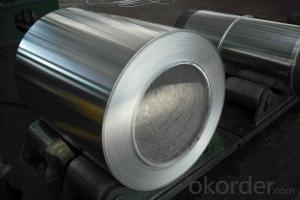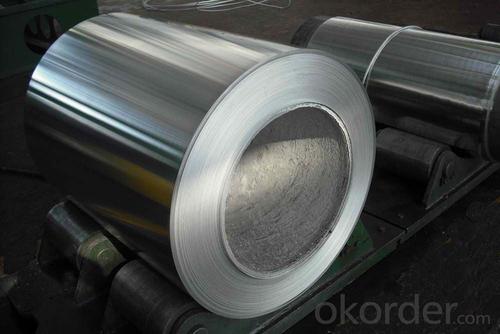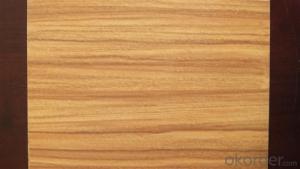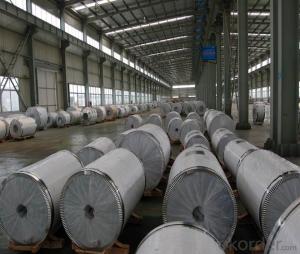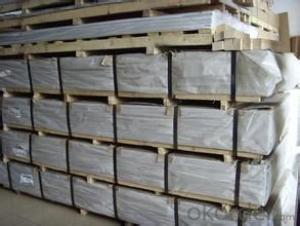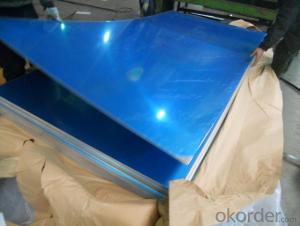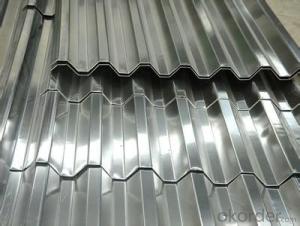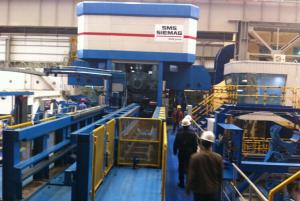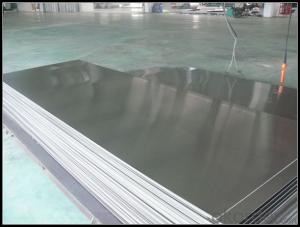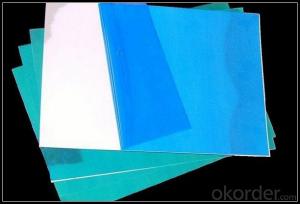Coiled Aluminum Sheet 1.8mm
- Loading Port:
- China Main Port
- Payment Terms:
- TT OR LC
- Min Order Qty:
- -
- Supply Capability:
- -
OKorder Service Pledge
OKorder Financial Service
You Might Also Like
High Quality and Factory Price Aluminum Coil
Specifications
Grade
| 1000 Series: 1050 1060 1070 1100 1200 1235 etc. 3000 Series: 3003 3004 3005 3104 3105 3A21 etc. 5000 Series: 5005 5052 5083 5086 5154 5182 5251 5754 etc. 6000 Series: 6061 6063 6082 6A02 etc. 8000 Series: 8006 8011 8079 etc. |
Thickness | 0.05~10mm |
Width | <1600mm |
Color | Metallic, Solid, RAL or by customer requirements |
Coating paint: | PVDF(Polyvinylidene Fluoride), PE(Polyester ) |
Coating thickness | as per customer’s request |
Gloss | 10-90%(EN ISO-2813:1994) |
Total coating thick | Polyester18~27micron(EN ISO-2360:1995) PVDF27 ~35micron(EN ISO-2360:1995) |
Coating hardness | 2H |
Protective film | PVC film, Colorless transparent or White-black |
Adhesion | 5B (EN ISO-2409:1994) |
Impact resistance | No cracking and peeling (A.S.T.M D2794-1993) |
Flexibility (T-bend) | 0T- 2T |
Temper | H16, H18, H24, H26, H26 |
Certification | ISO9001:2000, CE, SGS |
Coil's standard diameter | 1100mm |
Inner Diameter | 405mm/505mm |
Coil's standard weight | 2000kgs |
Payment | L/C ,T/T |
- Q: Are there any specific guidelines for handling and storing aluminum coils in warehouses?
- Specific guidelines exist for the handling and storage of aluminum coils in warehouses, with the aim of ensuring worker safety and maintaining coil integrity. Consider the following key points: 1. Equipment: When moving aluminum coils, it is crucial to utilize proper lifting equipment like cranes or forklifts with suitable attachments to prevent damage. Avoid dragging or dropping coils, as this may result in deformation or scratching. 2. Storage Location: Choose a well-ventilated, dry, and clean area for storing aluminum coils. The storage space should be away from direct sunlight, heat sources, and any chemicals that could react with aluminum. Maintaining consistent temperature and humidity levels is essential to prevent corrosion or other damage. 3. Stacking: Stack aluminum coils using appropriate dunnage material, such as wooden blocks or rubber mats, to prevent direct contact. This helps prevent scratches, dents, or other physical damage. Additionally, avoid excessive stacking height to prevent coil deformation or collapse. 4. Handling Precautions: Always wear proper personal protective equipment (PPE), including gloves and safety shoes, when handling aluminum coils. This safeguards against potential injuries from sharp edges or falling objects. 5. Labeling: Clearly label each coil with essential information such as weight, dimensions, alloy type, and any special handling instructions. This ensures proper identification and helps prevent mishandling or confusion. 6. Regular Inspections: Regularly inspect stored aluminum coils for signs of damage or corrosion. If any issues are identified, take immediate action to prevent further damage. 7. Security: Implement security measures to prevent unauthorized access to the storage area, protecting the coils from theft or vandalism. It is important to note that specific guidelines may vary based on the type and size of aluminum coils, as well as local regulations and industry standards. Consulting the manufacturer's instructions or seeking professional advice is recommended to ensure compliance with the appropriate handling and storage guidelines.
- Q: Can aluminum coils be used in solar panel installations?
- Yes, aluminum coils can be used in solar panel installations. Aluminum is a popular choice for the construction of solar panels due to its lightweight nature, corrosion resistance, and excellent thermal conductivity. Aluminum coils are often used as the backing material for solar panels, providing structural support and heat dissipation. They are also commonly used in the manufacturing of solar mounting systems, which hold the panels securely in place. Overall, aluminum coils are a reliable and efficient option for solar panel installations.
- Q: Can aluminum coils be used in the production of heat shields?
- Yes, aluminum coils can be used in the production of heat shields. Aluminum is a popular choice for heat shields due to its excellent thermal conductivity, lightweight nature, and high reflectivity of radiant heat. Heat shields are typically designed to protect sensitive components or structures from excessive heat generated by engines, exhaust systems, or other sources. Aluminum coils can be formed into various shapes and sizes to create effective heat shields that can dissipate heat and prevent its transfer to the surrounding areas. Additionally, aluminum is corrosion-resistant, making it suitable for applications where heat shields may be exposed to harsh environments or chemicals. Overall, aluminum coils are a suitable material for the production of heat shields due to their thermal properties, versatility, and durability.
- Q: What are the different color coating options for aluminum coils?
- The different color coating options for aluminum coils include standard solid colors, metallic colors, and special effect finishes such as textured or pearlescent coatings. These coatings can be applied using various methods like powder coating, liquid coating, or anodizing to achieve the desired color and aesthetic appeal.
- Q: Can aluminum coils be used in heat exchanger fins?
- Yes, aluminum coils can be used in heat exchanger fins. Aluminum is a popular choice for heat exchangers due to its excellent thermal conductivity, lightweight nature, and corrosion resistance. The use of aluminum coils in heat exchanger fins allows for efficient transfer of heat between two fluids, making it an ideal material for this application. Additionally, aluminum coils can be easily formed into various fin shapes, providing flexibility in design and maximizing the surface area for heat transfer. Overall, aluminum coils are commonly used in heat exchanger fins to enhance heat transfer efficiency and improve the overall performance of the heat exchanger system.
- Q: Can aluminum coils be used in the manufacturing of beverage cans?
- Indeed, beverage cans can be manufactured using aluminum coils. The utilization of aluminum in beverage can production is widespread owing to its multitude of benefits. Typically, aluminum coils are rolled into slender sheets, subsequently sliced, molded, and coated to achieve the final can structure. These coils offer a lightweight, sturdy, and resistant-to-corrosion material that is suitable for the storage and preservation of beverages. Moreover, aluminum is highly recyclable, rendering it an environmentally conscious option for the production of beverage cans.
- Q: How would our life on planet earth be modified if there was no aluminum at all? Examples welcomed.
- Airplanes would be too heavy to get off the ground. Howard Hughes built an airplane out of wood called the Spruce Goose. It couldn't get more than 20 feet off the ground and only went about a half mile. Aluminum is the lightest weight metal in relation to it's tensile strength.
- Q: Can aluminum coils be custom-made to specific requirements?
- Yes, aluminum coils can be custom-made to specific requirements. Aluminum coils are versatile and can be tailored to meet a wide range of specifications and applications. Manufacturers can customize the dimensions, thickness, width, and length of the coil to accommodate specific requirements. Additionally, various surface finishes, such as embossed patterns or coatings, can be applied to enhance the appearance or improve functionality. Customization of aluminum coils allows for precise matching of specific needs in industries such as construction, transportation, aerospace, and many others.
- Q: What are the common international standards and certifications for aluminum coils?
- Some common international standards and certifications for aluminum coils include ISO 9001 (Quality Management System), ISO 14001 (Environmental Management System), and ISO 45001 (Occupational Health and Safety Management System). Other certifications specific to aluminum coils may include ASTM (American Society for Testing and Materials) standards and certifications from industry associations such as the Aluminum Association.
- Q: Are aluminum coils suitable for insulation purposes?
- Yes, aluminum coils are suitable for insulation purposes. Aluminum is a highly effective conductor of heat and electricity, making it an ideal choice for insulation. Aluminum coils can be used in various applications such as HVAC systems, refrigeration units, and electrical wiring. The coils are typically coated with a layer of insulation material such as polyurethane foam or fiberglass to enhance their insulating properties. The combination of aluminum and insulation helps to prevent the transfer of heat or cold, providing excellent thermal insulation. Additionally, aluminum is lightweight, durable, and resistant to corrosion, making it a reliable choice for long-term insulation needs.
Send your message to us
Coiled Aluminum Sheet 1.8mm
- Loading Port:
- China Main Port
- Payment Terms:
- TT OR LC
- Min Order Qty:
- -
- Supply Capability:
- -
OKorder Service Pledge
OKorder Financial Service
Similar products
Hot products
Hot Searches
Related keywords
